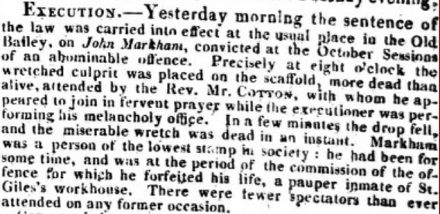The diary (pdf) of a man imprisoned at Newgate recorded for this date in 1819 that
A man was hanged this morning for an unnatural crime. Had my windows fastened up but could not sleep. They began putting up the scaffold at 4 o’clock. The tolling of the bell at 8 was frightful. I heard the crash of the drop falling and a woman screech violently at the same moment. Instantly afterwards, the sound of the pye man crying, “all hot, all hot.” ‘Tis dreadful hanging a man for this practice.* There are two, a man and boy now in jail, who were caught in flagrante delictu — and yet only sentenced to two years imprisonment. The poor wretch was half dead, so they told me, before he was hanged.
Of this poor soul fallen away into the indifferent cries of the pye-man we have this from The Morning Post of December 30, 1819 (see also Rictor Norton):
John Markham was obscure, no doubt; his condemnation literally was for unspeakable acts, since it barely rates a line at all in the Old Bailey’s archives.
But the aural observer of his death was not obscure at all.
John Hobhouse, though he would eventually become the first Baron Broughton, was a buddy of the queer-friendly Lord Byron (the fourth canto of Byron’s Childe Harold’s Pilgrimage is dedicated to Hobhouse). Hobhouse was also a prominent radical rabble-rouser, which is precisely why he was in Newgate on the day of Markham’s hanging.
All of this occurred in the tense wake of the Peterloo Massacre, which saw British cavalry ride down their countrymen in Manchester for assembling to demand the reform of a parliament long grown egregiously unrepresentative. (Manchester was a case in point: it had no M.P. at all based on a centuries-old allocation of boroughs even though it had now boomed into one of the realm’s leading centers of industry.**)
Following the Peterloo outrage, our correspondent Mr. Hobhouse had suggested in one of his many combative pamphlets that absent such brutal exertions the members of Parliament “would be pulled out by their ears” at the hands of an aggrieved populace. Given the all-too-recent aftermath of the Napoleonic Wars — and their antecedent, the French Revolution — the potential threat in these words seemed to the powers that be a step beyond mere colorful rhetoric.
Accordingly, the House of Commons judged Hobhouse guilty of a breach of privilege and had him arrested earlier that same December. His cause more advanced by the martyrdom than inconvenienced by a gentleman’s loose detention — Hobhouse’s at-liberty associates not only held political meetings in his ample prison apartments but planned and advertised them in advance — the man won election to that selfsame House of Commons from Westminster the following March.
* A few days later, Hobhouse will record in his diary that he has been told that Markham “had committed his crime with a pauper in a workhouse on a coffin.”
** The U.K. finally enacted parliamentary reform in 1832. A few years after that, it even stopped hanging people for sodomy.
On this day..
- 1661: Jacques Chausson, "Great Gods, where is your justice?"
- 1987: Five in South Yemen for the Events of '86
- 1680: William Howard, Viscount Stafford
- 1594: Jean Châtel, lipstabber
- 1868: Thomas Jones, bad uncle
- 1854: Uhazy, amid Minnesotan depravity
- 1934: Leonid Nikolaev, Kirov's assassin
- 1543: Andrei Shuisky, gone to the dogs
- 1479: Bernardo di Bandino Baroncelli, sketched by Leonardo da Vinci
- 2009: Akmal Shaikh, mentally ill drug mule
- 1903: Emily Swann and John Gallagher, the Wombwell murderers
- 1874: John Murphy


